|
Carlsbad Eschatology Conference 2008 - Daily Reports!
Tim Martin and Jeff Vaughn have arrived in Carlsbad to attend this year's Carlsbad Eschatology Conference!
We will be offering a daily report about the events, speakers, and fellowship that takes place over the next few days of the conference.
We will also include a daily report on the three-day debate between Don Preston and Mac Deaver! This highly anticipated debate is sure to be at the center of discussions involving eschatology for the foreseeable future.
Thursday, March 13 at the Carlsbad Eschatology Conference
Well, the first day of the conference is now over. It's very late, but we wanted to give our report of what happened today. We don't have the time or energy to format and upload pictures tonight, but we did take plenty of pictures during the day. We will add them as an album when we can. Also, for those of you who ordered books today, we plan to do our best to get them in the mail tomorrow (from Carlsbad, NM), but if we are not able to make it to the PO, then expect shipment early next week.
The Carlsbad Experience
The morning started at Carlsbad Caverns 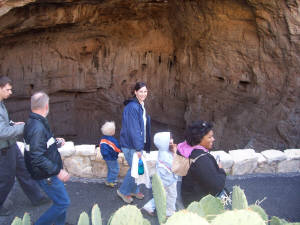 National Park. Quite a few of us took in the tour. It was astonishing. The sheer size and remarkable grandeur of the place left all of us in awe. Even the children were astonished as the winding path led downwards into the black abyss. Once inside, we marveled at the amazing collection of cave features that surrounded us in every direction. The most amazing National Park. Quite a few of us took in the tour. It was astonishing. The sheer size and remarkable grandeur of the place left all of us in awe. Even the children were astonished as the winding path led downwards into the black abyss. Once inside, we marveled at the amazing collection of cave features that surrounded us in every direction. The most amazing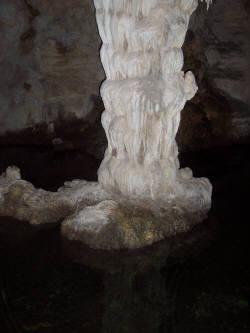 part was the copious variety of shapes and sizes of formation in the caverns. None of us who went in for the first time were expecting the enourmity of what Carlsbad Caverns is all about. The really neat part was seeing all the amazing variety that all resulted from the same basic process. part was the copious variety of shapes and sizes of formation in the caverns. None of us who went in for the first time were expecting the enourmity of what Carlsbad Caverns is all about. The really neat part was seeing all the amazing variety that all resulted from the same basic process.
By lunch time, everyone was ready to head back to town for the opening of the conference. A one-minute elevator ride back up 750 feet to the surface sent us back on our way.
Conference Sessions
Kurt Simmons welcomed everyone and gave brief introductions. Visitors have come from all over. Atlanta, GA, was mentioned as was Detroit, MI. There are also guests from Iowa, Arkansas, Arizone, and quite a contingent from Texas. Attendance appeared to be around 60-65 people for the sessions, but this increased noticeably for the debate after Dinner.
There were four sessions before the dinner break.
The first session was an overview of preterism by Kurt Simmons. If you came to investigate preterist eschatology, then this one was for you.
The second session was "Why I am a Full-Preterist" by Tom Koske. The bottom line? I am a full-preterist, says Tom, because of what Jesus said! Tom related some humorous experiences from his introduction to and investigation of preterism. One great statement stood out in this session. Tom mentioned his own uncanny ability that really hit home. Tom says, "I can ask questions that I can't answer." Yeah... we know what that is like! More from Tom tomorrow; something about what the apostles said.
The third session 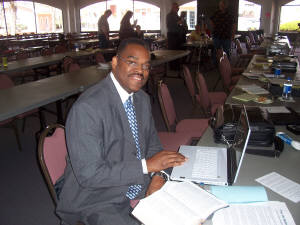 was William Bell on the topic of the Hymenean heresy. This topic turned out to be very relevant to the debate that came a few hours later because Mac Deaver wrapped up his night with this specific charge against preterists. Anyway, William showed that Paul's response to Hymeneus and Philetus demonstrates that a physical resurrection could not have been at issue in this controversy. What was the point of Paul's condemnation? Hymeneus and Philetus had taught that the resurrection was past while the Temple and Jerusalem were still standing! This contradicted Jesus' eschatological teaching and undermined the credibility of Jesus and the apostles who knew that the resurrection could not take place until the judgment. In essence, the Hymenean heresy boiled down to the separation of the obliteration of the Old Covenant system from fulfillment of the resurrection. (Remarkably, precisely the thing that futurists do today -- separate the resurrection from what happened in A.D. 70! Mac Deaver's debate material to come later in the day was a clear example.) Hymeneas and Philetus taught the fulfillment of the resurrection before A.D. 70 because they sought justification for the perpetual observance of the Judaistic system. To them, it was the Temple, the Law, and Christ which nullified the gospel that Christ and the apostles taught. Paul corrected them and turned right around and spoke of the judgement of the "living and the dead" (resurrection) that was "about to be" (2 Tim. 4:1). was William Bell on the topic of the Hymenean heresy. This topic turned out to be very relevant to the debate that came a few hours later because Mac Deaver wrapped up his night with this specific charge against preterists. Anyway, William showed that Paul's response to Hymeneus and Philetus demonstrates that a physical resurrection could not have been at issue in this controversy. What was the point of Paul's condemnation? Hymeneus and Philetus had taught that the resurrection was past while the Temple and Jerusalem were still standing! This contradicted Jesus' eschatological teaching and undermined the credibility of Jesus and the apostles who knew that the resurrection could not take place until the judgment. In essence, the Hymenean heresy boiled down to the separation of the obliteration of the Old Covenant system from fulfillment of the resurrection. (Remarkably, precisely the thing that futurists do today -- separate the resurrection from what happened in A.D. 70! Mac Deaver's debate material to come later in the day was a clear example.) Hymeneas and Philetus taught the fulfillment of the resurrection before A.D. 70 because they sought justification for the perpetual observance of the Judaistic system. To them, it was the Temple, the Law, and Christ which nullified the gospel that Christ and the apostles taught. Paul corrected them and turned right around and spoke of the judgement of the "living and the dead" (resurrection) that was "about to be" (2 Tim. 4:1).
The fourth session of the morning was "Re-Thinking the Kingdom" by Kurt Simmons. This was certainly the most thought-provoking, if not outright controversial, session of the day. Kurt argued that the theology of his traditional background had wrongly narrowed the definition of the Kingdom to the Church. His corrective suggestion? The Kingdom is viewed rightly only when seen in its universal/global scope. Kurt went back to Genesis and began with a global view of physical creation, a global view of the flood, and how the dominion that was originally given to Adam (which Kurt insisted was physical and universal) comes to completion in Christ. God desires his people (who rule and reign with Christ) to grasp the total dominion in all the world (defined as planet earth) that God has designed them to have since the beginning. Kurt mentioned that this may sound like the premillenial view (which also emphasizes a global/worldwide Kingdom dominion), but "the world-wide dominion" given to Adam, carried on through Abraham, manifested in the reign of Solomon, must be enacted by Christians today. Anything less is to unbiblically limit the "world-wide" Kingdom of Christ. Kurt sounded a bit like the Reconstructionists of the 1980s in this session, but he was out to make sure that everyone knew that even preterists need to re-think the scope and nature of God's Kingdom rule. And above all (the ending was quite creative) preterists need to know that the Kingdom is "NOT COVENANTAL" but global and world-wide. Maybe premillennialism doesn't get it all wrong after all?!?!
Friday, March 14 at the Carlsbad Eschatology Conference
Well, it's pretty late and "conference fatigue" is definitely setting in. Below are the high points of the events of the day in Carlsbad. The one thing I should mention is that, after taking in the debate tonight, our mental mental facilities are pretty fried at the moment. There was so much information presented in such a short time (particularly by Don) that it was very difficult to keep up with taking notes by hand, particularly the details of all the Scripture references and comparisons. In fact, there will be some details in the debate and detailed arguments that we may have missed below. We hope to mention all the main issues.
We will tell you one thing, though. You should get this debate as soon as it becomes available on DVD. What happened tonight in Carlsbad will be talked about for years and years in the world of covenant eschatology. What's more is that there were cryptic comments that implied of even more amazing things to come tomorrow. But first things first. Let's begin at the beginning of the day and work our way through.
Conference Sessions
The first session of the day was by 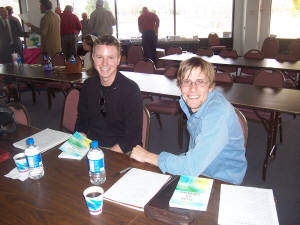 Jack Gibbert from Texarkana, Texas. Jack gave a rundown on his background in the Churches of Christ and reminisced on some fun times back in "the earlier days." Jack mentioned a guy by the name of Ron McRay who turned his world (along with another of Jack's friends) upside down by asking the right questions. Jack then went to the meat of his message: How to introduce preterism without causing people to swallow their own teeth! Jack talked about some strategy that preterists don't always keep in mind when they share their views with others. The result? Preterism doesn't grow like it could because preterists are impatient. The key Jack offered was that preterists will be most effective when they remember to take it a piece at a time with newbies and when they let others make the discoveries on their own. Strategy and patience will be the key to the long-term success of preterism Jack Gibbert from Texarkana, Texas. Jack gave a rundown on his background in the Churches of Christ and reminisced on some fun times back in "the earlier days." Jack mentioned a guy by the name of Ron McRay who turned his world (along with another of Jack's friends) upside down by asking the right questions. Jack then went to the meat of his message: How to introduce preterism without causing people to swallow their own teeth! Jack talked about some strategy that preterists don't always keep in mind when they share their views with others. The result? Preterism doesn't grow like it could because preterists are impatient. The key Jack offered was that preterists will be most effective when they remember to take it a piece at a time with newbies and when they let others make the discoveries on their own. Strategy and patience will be the key to the long-term success of preterism
Next up was William Bell with a presentation titled, "Identifying the Last Days." William asked a good question that most Christians have never heard before. "Where do the 'last days' begin in the Bible?" The first mention is Gen. 49:1-2 with Jacob's words to his 12 sons [note the context of the origination with God's covenant people]. William then went on to the Song of Moses in Deut. 32 which talks about Israel's last days in prophecy. After setting this context and background, William then did a masterful job of showing how the connections from Jacob (Gen. 49) and Moses (Deut. 32) to 2 Peter 3 and other "last days" texts in the New Testament are overwhelming. Everything in New Testament prophecy is sourced in the story of Israel which begins in Genesis and expands greatly in the days of the Exodus. William's presentation impressed on everyone the importance of viewing the NT "last days" as Israel's last days originating in Gen. 49 and Deut. 32, etc.
The third session was Part 1 of Kurt Simmons' "Overview of Revelation." Kurt showed the historical difficulties in interpreting the book. and the necessity of understanding the OT background. This background, says Kurt, is rooted in the very first part of Genesis with the banishment of Adam and Eve from the original Garden of Eden. Kurt emphasized that "the death" destroyed at the various "ends" of the book is Hadean death, the annihilation of the Hadean world composed of paradise and tartaraus.
The fourth session of the day was by Tom Kloske and titled "Why Am I a Preterist?" This session was oriented around what Paul said. Tom went through a long string of texts which show the near expectation that pervades Paul's teaching. Tom also took Mac Deaver to task for one issue that came up in last night's debate. Tom showed that there must have been a transition era during the New Testament (what Mac Deaver denied, in essence, by saying the Law ended at the cross). Tom's argument was unique to us and truly ingenius. Tom pointed out that it would have taken time for the gospel to go out to all the Jews across the Roman Empire after the Resurrection of Christ. What about Jews who died during this time? Would they be condemned? Remember, the law had "passed away" according to Deaver at the cross. Yet the gospel had not been preached to all of the Jews until much later! What happened to any Jew in limbo who would have died (surely some) during this time period? Did God condemn these Jews who were "all of a sudden" under the gospel and not the law, yet never lived to hear the gospel preached to them? That is a great point! Tom also had two great definitions that left the audience giggling. He asks, "What is the definition of a Philosopher?" His answer? "A blind man in a dark alley looking for a black cat!" But then another question came. "What is the definition of a Theologian?" Answer: "A blind man in a dark alley looking for a black cat, and thinks he found it!!" The audience erupted in laughter.
Next session Kurt Simmons continued with Part 2 of the Revelation Overview. Kurt emphasized a number of times about how the "whole world" was involved in the events of Revelation. The book talks not only about events in Judea, but all of Rome as well. This is "world-wide" and the facts of the book of Revelation are overlooked by those who view the events covenantally rather than "globally." Kurt insisted that the book is "not covenantal at all, but political and universal, dealing with world political powers." Of curious note was his description that the Sea in Revelation 21:1 is a symbolic description of the realm of all of heathendom. The fulfillment of Rev. 21:1, according to Simmons is oriented around the end of the barrier of Jew and Gentile in Christ Jesus. It was an interesting session.
Saturday, March 15 at the Carlsbad Eschatology Conference
Sorry that we weren't able to put up this report earlier. Between the concluding schedule of the conference and travel, we had difficulty finding the time and energy to complete the reporting of the conference. Below is a record of the last sessions during the final day of the conference. This included four debate sessions before lunch and two presentations after lunch to conclude the conference on Saturday.
The first session was 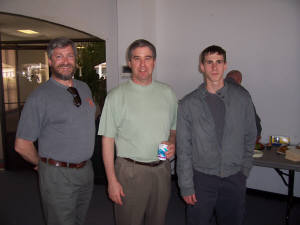 the last in Tom Kloske's series titled "Why I am a Full-Preterist." Tom zoomed in on the eschatalogical teaching of Peter, James, and John. Beginning with Peter's citation of Joel 2 in Acts 2, Tom worked his way through the biblical material from these three apostles regarding the coming of Christ. Tom had more great questions such as "Why does it mean 'soon' today [to futurists] when it didn't mean 'soon' to those to whom these passages were written?" Of course, no session by Tom would be complete without at least one good insight into the world we live. So Tom asked, "What is behind every successful man?" Answer: "A surprised mother-in-law!" Tom's presentations provide overwhelming evidence, for any willing to consider it, that the coming of Christ took place right on schedule at the end of the generation of those who first heard Jesus teach. the last in Tom Kloske's series titled "Why I am a Full-Preterist." Tom zoomed in on the eschatalogical teaching of Peter, James, and John. Beginning with Peter's citation of Joel 2 in Acts 2, Tom worked his way through the biblical material from these three apostles regarding the coming of Christ. Tom had more great questions such as "Why does it mean 'soon' today [to futurists] when it didn't mean 'soon' to those to whom these passages were written?" Of course, no session by Tom would be complete without at least one good insight into the world we live. So Tom asked, "What is behind every successful man?" Answer: "A surprised mother-in-law!" Tom's presentations provide overwhelming evidence, for any willing to consider it, that the coming of Christ took place right on schedule at the end of the generation of those who first heard Jesus teach.
The last conference session of the conference was an overview of 1 Cor. 15 by Kurt Simmons. This session might best be described as the "NOT COVENANTAL" view of the Resurrection. Kurt broke the chapter up into three parts: vv. 1-34 deal with the fact of Resurrection and consequences of denial, vv. 35-50 deal with the nature of the Resurrection, natural-corruptible vs. spiritual-incorruptible, and vv. 51-57 deal with the mystery of the eschatological change.
Kurt began his treatment by stating the best way to understand the Resurrection is by understanding our "long and weary existence under the sun." V. 19 is the touchstone of the whole passage, the point around which the whole passage revolves: "If in this life only we have hope in Christ, we are of all men most pitiful." This means, according to Kurt, that our hope in this life is heaven. We cannot partake of the hope in "this life" for our hope is realized fully only after death in the blessed state of heaven.
At this point Kurt endorsed much of Mac Deaver's debate points in the previous sessions. Kurt claimed that Mac's view of the world to come is correct. "The world to come" is properly "heaven" and not the new covenant, for we do not have Resurrection in this life. Kurt commented that Don Preston never outlined what Resurrection "is" because of his covenantal presupposition brought to the debate. "This life" is set over against "that life." The problem, says Kurt, is that to say that we partake of Resurrection life in this world would mean that we are in heaven now... "Who can look at me square in the face and tell me that I am in heaven now? I am not in heaven now, which means that I do not have Resurrection life now."
What is the Resurrection according to Kurt? Resurrection is Hadean [related to Hades, the abode of the dead]. All men from Abel on looked forward to the end of Hadean death. Hades stands last in the line of enemies to be destroyed! It was not sin and death, as Don Preston argued throughout the debate, that was the last enemy; it was Hades that was the last to be destroyed. Resurrection is not received in this life or in this world [i.e. physical and universal], but the next life/world to come. Kurt referenced the Preston-Deaver debate once more claiming that the root issues of Resurrection were entirely missed during the debate because of the mistakes on both sides: Preston's error in viewing the resurrection as covenantal and Deaver's error of futurism.
Kurt claimed that the nature of the Resurrection body requires the Resurrection to take place for each individual at death, for there is neither male nor female, but those who partake of the Resurrection are "like the angels of God." What do we have now? "Our 'earth-suits' are perfectly made for our existence here, but there is no time or space in heaven." Our inheritance is not received in this life. Our inheritance is eternal life in heaven. We have the promise of eternal life, made sure by Christ's work, but we do not have eternal life until the next life.
From there, Kurt delved into the nature as originating in and demanded by creation. We are sons of Adam by nature as physical beings, Adam being the father of all human beings alive on planet earth. Christians are adopted by God in a legal sense. Adoption is a legal status, not a change of nature! That requires that we look forward to eternal life upon death when we put aside our physical bodies. Kurt's conclusion was that preterism still has much error and mistaken concepts that must be weeded out in the future. And with that the conference was...
Concluded!
Pictures from Carlsbad
|






